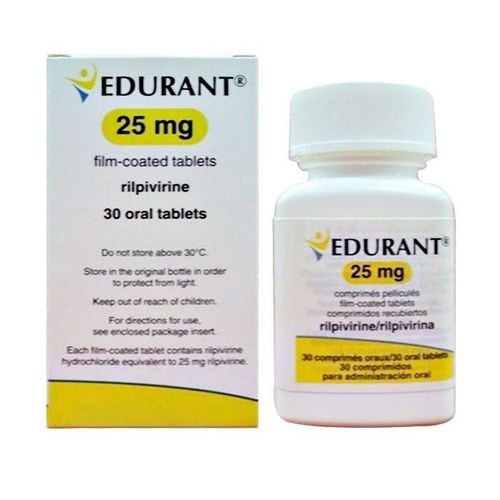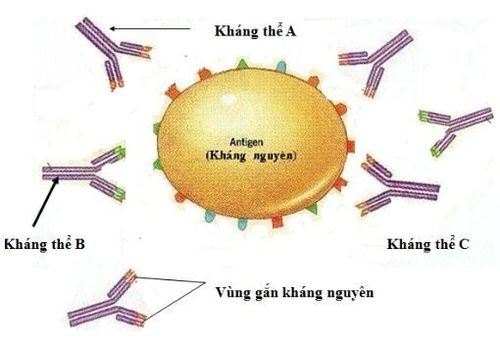This is an automatically translated article.
Polivy is indicated for the treatment of diffuse large B-cell lymphoma after at least two other cancer treatments have failed. Polivy is often used in combination with Bentamamine (Bendeka, Treanda) and Rituximab (Rituxan) in the treatment of adult diffuse large B-cell lymphoma after at least two failed previous treatments. .1. What is Polivy?
Polivy is also known as Polatuzumab vedotin-piiq. This is an antibody conjugate (a cell-killing antibody) against a protein called CD79b, which is found on the surface of some cancer cells. Antibodies, normally found in the body, are developed by the immune system to destroy foreign matter, specifically bacteria. Polatuzumab vedotin-piiq is a man-made antibody that causes the immune system to attack cancer cells that have the CD79b protein on them.
Polatuzumab vedotin-piiq is often used in combination with two other drugs to help kill cancer cells. First, Rituximab is a monoclonal antibody that works with your immune system to attack and destroy cancer cells. The second, Bentamustine hydrochloride, is a chemotherapy that damages the DNA of cancer cells. The combination of these three drugs is thought to be able to attack cancer from different angles.
2. How to use Polivy?
Polivy is given through an intravenous (IV) line. The dosage is based on a combination of your height and weight and how often you receive the medicine will be decided by your treating doctor. Your doctor will prescribe additional antihistamines (Diphenhydramine, Loratadine) and fever-reducing medicines, such as Acetaminophen, to prevent or reduce the risk of an allergic reaction.
3. Undesirable effects when using Polivy
There are several things you can do to control the side effects of Polivy . Here are some of the most common or important side effects of using Polivy:
3.1. Peripheral Neuropathy Peripheral neuropathy is a toxic medical condition that affects the nerves. Peripheral neuropathy is characterized by a sensation of numbness or tingling in the hands or feet after using Polivy, which often occurs when wearing socks or gloves.
This condition may become more severe with the use of additional doses of the drug. In some people, symptoms will slowly go away after stopping treatment with Polivy, but for some, it never goes away completely.
3.2. Low white blood cell count or leukopenia White blood cells (WBC) are very important to fight infection. While being treated for cancer, specifically with Polivy, your white blood cell count may drop, putting you at higher risk of infection. You should tell your treating doctor if you have a fever with a temperature higher than 100.4°F equivalent to 38°C accompanied by a feeling of sore throat or cold, shortness of breath, cough, burning when urinating or ulcers do not heal.
3.3. Low platelet count or thrombocytopenia Platelets are important for blood clotting, so when your platelet count is low, you have a higher risk of bleeding. The clinical sign of thrombocytopenia is any excessive bruising or bleeding, including nosebleeds, bleeding gums, or blood in the urine or bloody stools. If the platelet count becomes too low, you may be given a platelet transfusion.
3.4. Anemia Your red blood cells are responsible for carrying oxygen to the tissues in your body. When the number of red blood cells in your blood is low, you may feel very tired or weak. You should inform your treating doctor if, during treatment with Polivy, you experience shortness of breath, shortness of breath or chest pain. If the count is too low, your doctor may recommend a blood transfusion.
3.5. Diarrhea or intestinal problems (colitis, inflammatory bowel disease): Abdominal pain, diarrhea, cramps, mucus or bloody stools, dark or tar-like stools, fever. The degree of diarrhea can vary from person to person.
3.6. Less Common Adverse Reactions Infusion-related undesirable effects: Infusion may cause reactions that may lead to chills, fever, low blood pressure, nausea, and vomiting. You may be prescribed Tylenol and Diphenhydramine before your infusion to help prevent these reactions. Some people will also receive steroid injections before the infusion to prevent a reaction. Reactions most commonly occur during the first week of treatment, including the evening after the infusion. Tumor lysis syndrome: If there were a large amount of tumor cells in your body prior to treatment with Polivy, you have an increased risk of tumor lysis syndrome. This happens when tumor cells die too quickly and the waste products of these tumors overwhelm the body. You may be prescribed the addition of Allopurinol and intravenous fluids to help prevent this. Tumor lysis syndrome is characterized by nausea, vomiting, diarrhea, drowsiness, lethargy, and decreased urination. This syndrome can also affect your kidney function. Your doctor will monitor your kidney function with blood tests. Polivy can cause liver toxicity, which your doctor can monitor using blood tests called liver function tests. If you develop elevated liver function tests, your doctor may adjust your dose or stop the medication. Some clinical signs warn of yellowing of the skin or eyes, dark or brown urine, or pain in the abdomen, as these may be signs of liver toxicity. Progressive multifocal encephalopathy (PML): Progressive multifocal encephalopathy (PML) is a rare but very serious brain infection that has been reported with this medicine. Signs of progressive multifocal encephalopathy may worsen over weeks or months. Signs of this syndrome include changes in usual mood or behavior, confusion, problems with thinking, memory loss, changes in vision, voice or way of walking, and decreased strength. or weakness on one side of the body. If you develop any of these signs, notify your treating doctor immediately.
4. Effects of Polivy on fertility
Exposing your unborn baby to Polivy can cause birth defects, so you should not become pregnant or father a child while taking this medicine. Use of reasonable contraception is necessary during treatment and for at least 3 months after treatment. Even if your period stops or you believe you are not producing sperm, you may still be able to get pregnant and conceive. You should not breast-feed while using Polivy or for 2 months after your last dose. In summary, Polivy is indicated for the treatment of diffuse large B-cell lymphoma after at least two other cancer treatments have failed. Polivy is often used in combination with Bentamamine (Bendeka, Treanda) and Rituximab (Rituxan) in the treatment of adult diffuse large B-cell lymphoma after at least 2 failed previous regimens. .
Follow Vinmec International General Hospital website to get more health, nutrition and beauty information to protect the health of yourself and your loved ones in your family.
Please dial HOTLINE for more information or register for an appointment HERE. Download MyVinmec app to make appointments faster and to manage your bookings easily.













